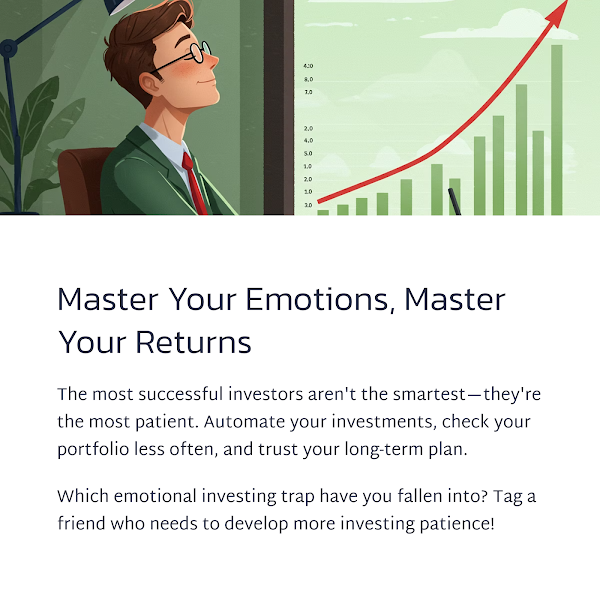Most Investors Fail for One Simple, Stupid Reason
Hello~ Everyone! Today I have some useful information about why most investors fail for one surprisingly simple reason. Are you curious to find out right away? 😊
Have you ever wondered why so many smart people struggle with investments? It's not about intelligence or education - it's often about something much more basic.
Let's explore this important topic together and learn how to avoid this common pitfall in your own investment journey!
🧠 The Psychology Behind Investment Failures
When we talk about investing, most people immediately think about complex strategies, market timing, or picking the next big stock. But what if I told you these aren't the main reasons most investors fail?
The truth is much simpler, and it has more to do with our human nature than with financial expertise.
| Emotional Decision Making | Overconfidence Bias |
| FOMO (Fear Of Missing Out) | Short-term Thinking |
| Loss Aversion | Confirmation Bias |
| Herd Mentality | Analysis Paralysis |
⏰ The #1 Reason Investors Fail: Impatience
Would you believe that impatience is the single biggest killer of investment success? It sounds almost too simple to be true, but let me explain why this is such a powerful force.
Warren Buffett once said that the stock market is a device for transferring money from the impatient to the patient. This wisdom has stood the test of time for good reason. 💡
When we invest with a short-term mindset, we're essentially gambling rather than investing. True investing requires time for compound interest to work its magic.
📊 How Impatience Destroys Returns
Did you know that the average investor significantly underperforms the market? According to DALBAR's annual Quantitative Analysis of Investor Behavior, the average equity fund investor earns much less than market indices over time.
The main reason? Investors jump in and out of investments at exactly the wrong times! 😱
They buy high when excitement is peaking, then sell low when fear dominates. This behavior is driven by impatience and emotional reactions to short-term market movements.
| Panic Selling | Performance Chasing | Market Timing |
| Frequent Trading | High Transaction Costs | Tax Inefficiency |
| Missed Recovery Days | Trend Following | Ignoring Fundamentals |
| Media Influence | Short-term Focus | Unrealistic Expectations |
🌱 Cultivating Patience as Your Investment Superpower
The good news is that patience is a skill you can develop. Unlike market timing or stock picking, which require specialized knowledge, patience is accessible to everyone. 🙌
Start by setting realistic expectations. Understand that wealth building through investing is a marathon, not a sprint. The magic of compound interest works over decades, not days or months.
Create an investment plan based on your long-term goals, not short-term market movements. Then, the hardest part: stick to it through market volatility.
🛠️ Practical Tools to Overcome Impatience
Automating your investments can help remove emotion from the equation. Set up regular contributions and forget about trying to time the market. 💪
Consider working with a financial advisor who can serve as a behavioral coach during difficult market periods. Sometimes having someone to talk you off the ledge makes all the difference.
Limit how often you check your portfolio. Research shows that investors who check their portfolios less frequently make better decisions and earn higher returns.
🎯 Conclusion: The Patient Investor Wins
The simple truth is that successful investing isn't about being the smartest person in the room—it's about being the most patient. 🏆
By understanding that impatience is the enemy of good returns, you've already taken the first step toward becoming a better investor than most.
Remember: The stock market transfers money from the impatient to the patient. Which group do you want to be in?
Q: How long should I hold my investments?
A: Warren Buffett famously said his favorite holding period is "forever." While that might be extreme, think in terms of years or decades rather than months.
Q: What if I see a better investment opportunity?
A: Before switching investments, ask yourself if you're acting based on solid analysis or just chasing returns. Remember that the grass often just seems greener elsewhere.
Q: How can I stay patient during market crashes?
A: Focus on the long-term plan, not short-term movements. Historically, markets have always recovered and reached new highs given enough time.
See you next time with another important investment topic! 😊 Bye Bye~





Comments
Post a Comment